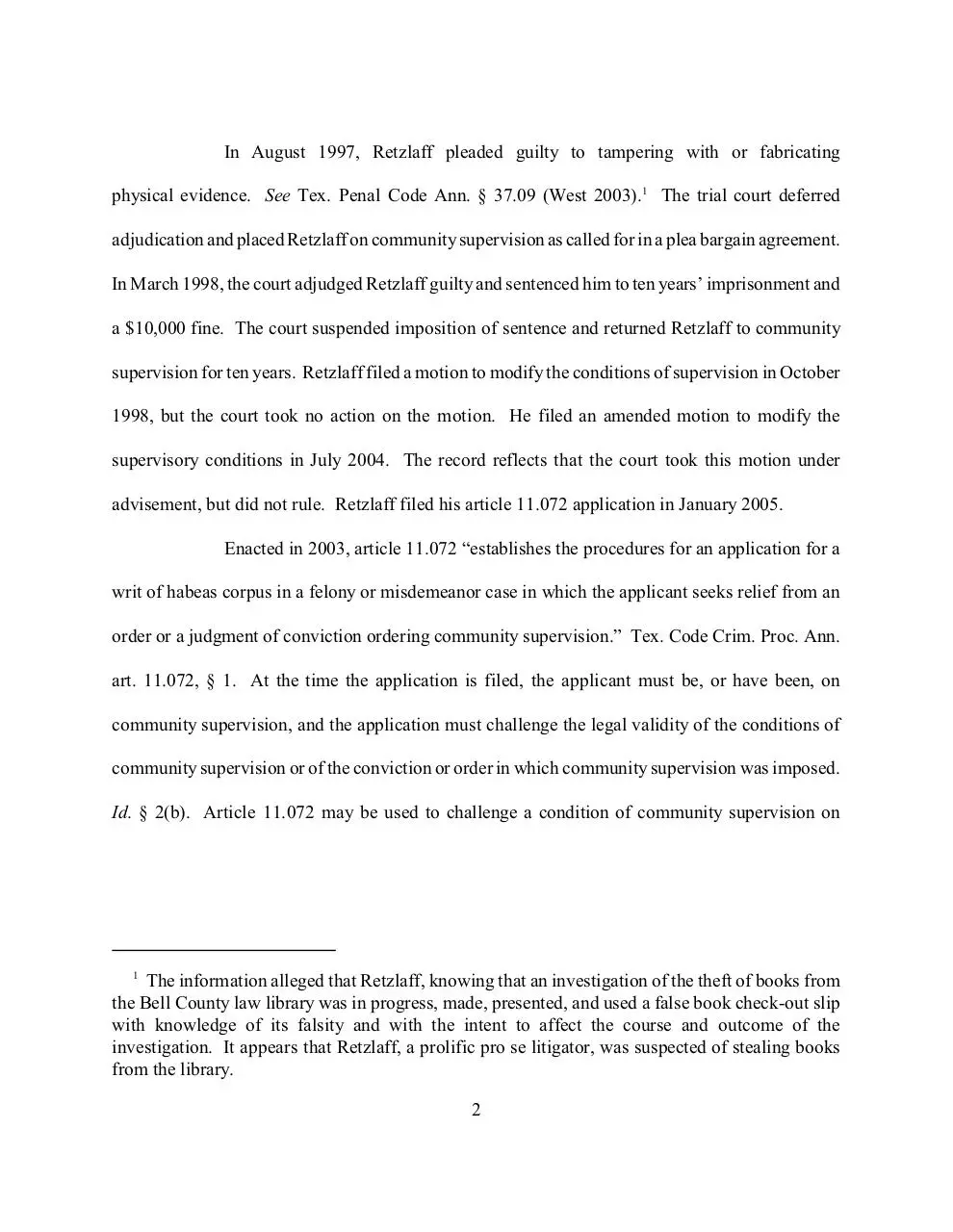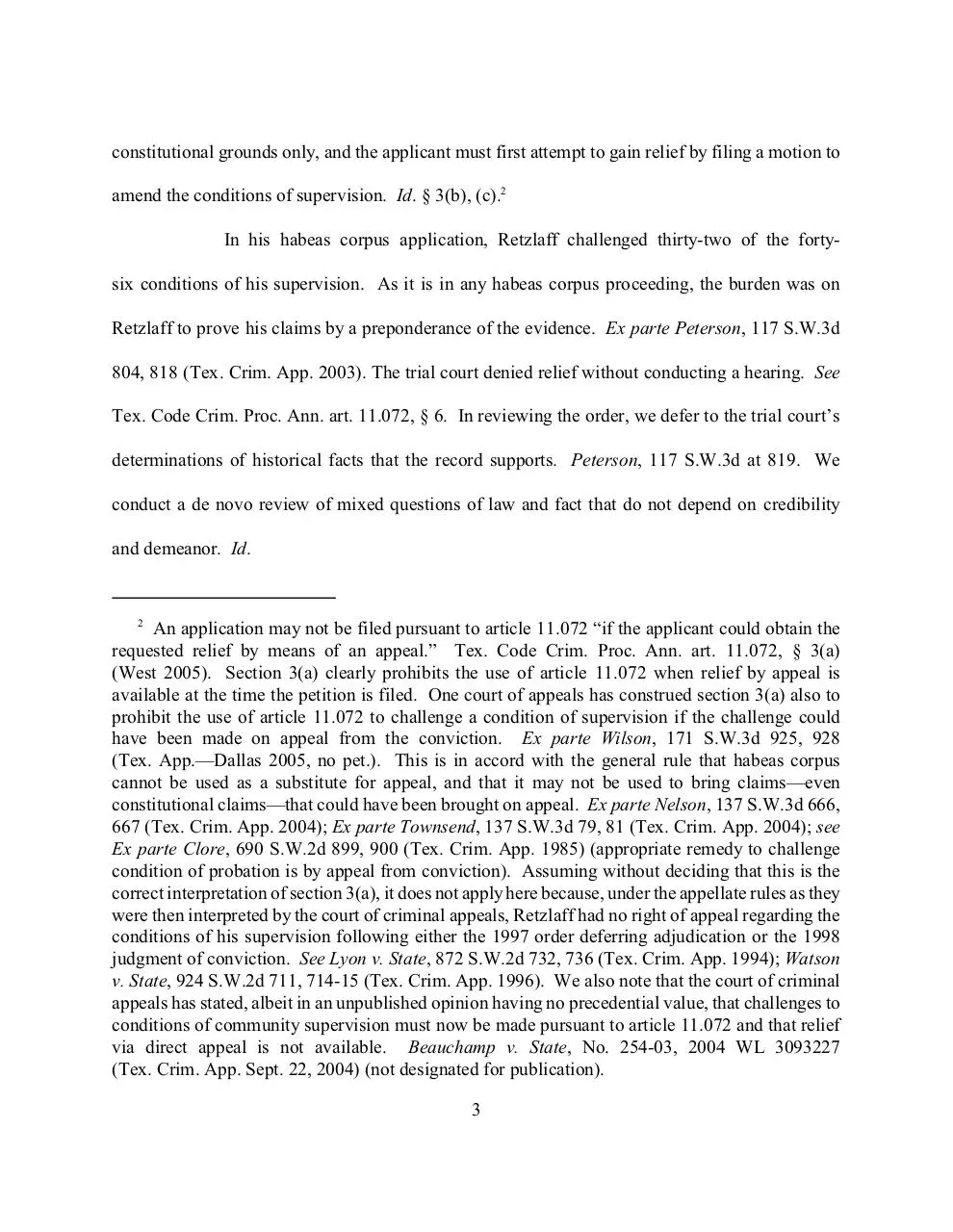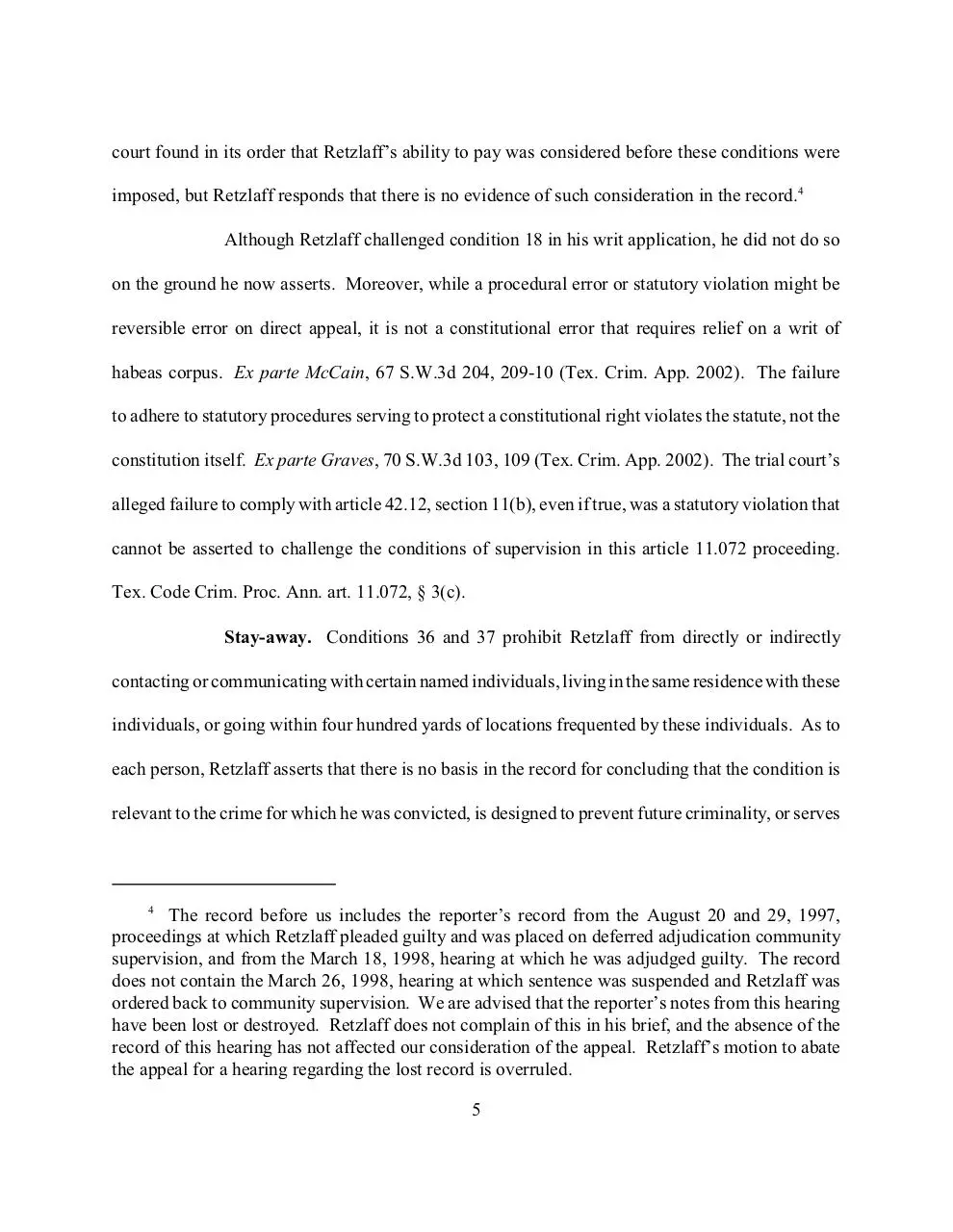coa falsifyingagovtdocument 03 05 00277 cr (PDF)
File information
This PDF 1.4 document has been generated by PrintServer130 / Corel PDF Engine Version 11.4.0.100, and has been sent on pdf-archive.com on 20/02/2015 at 01:18, from IP address 108.59.x.x.
The current document download page has been viewed 639 times.
File size: 84.7 KB (11 pages).
Privacy: public file





File preview
TEXAS COURT OF APPEALS, THIRD DISTRICT, AT AUSTIN
444444444444444444444444444
ON MOTION FOR REHEARING
444444444444444444444444444
NO. 03-05-00277-CR
Ex parte Thomas Retzlaff
FROM THE DISTRICT COURT OF BELL COUNTY, 264TH JUDICIAL DISTRICT
NO. 47,846-A, HONORABLE JOE CARROLL, JUDGE PRESIDING
MEMORANDUM OPINION
We withdraw the opinion and judgment dated December 5, 2006, and substitute
the following.
Thomas Retzlaff, acting pro se, applied for habeas corpus relief from a judgment
of conviction ordering community supervision. See Tex. Code Crim. Proc. Ann. art. 11.072
(West 2005). The writ issued by operation of law, and the trial court subsequently denied relief in
a written order. See id. art. 11.072, §§ 4(a), 6. This appeal followed. See id. § 8. We will
affirm the order in part, and reverse and render in part.
In August 1997, Retzlaff pleaded guilty to tampering with or fabricating
physical evidence. See Tex. Penal Code Ann. § 37.09 (West 2003).1 The trial court deferred
adjudication and placed Retzlaff on community supervision as called for in a plea bargain agreement.
In March 1998, the court adjudged Retzlaff guilty and sentenced him to ten years’ imprisonment and
a $10,000 fine. The court suspended imposition of sentence and returned Retzlaff to community
supervision for ten years. Retzlaff filed a motion to modify the conditions of supervision in October
1998, but the court took no action on the motion. He filed an amended motion to modify the
supervisory conditions in July 2004. The record reflects that the court took this motion under
advisement, but did not rule. Retzlaff filed his article 11.072 application in January 2005.
Enacted in 2003, article 11.072 “establishes the procedures for an application for a
writ of habeas corpus in a felony or misdemeanor case in which the applicant seeks relief from an
order or a judgment of conviction ordering community supervision.” Tex. Code Crim. Proc. Ann.
art. 11.072, § 1. At the time the application is filed, the applicant must be, or have been, on
community supervision, and the application must challenge the legal validity of the conditions of
community supervision or of the conviction or order in which community supervision was imposed.
Id. § 2(b). Article 11.072 may be used to challenge a condition of community supervision on
1
The information alleged that Retzlaff, knowing that an investigation of the theft of books from
the Bell County law library was in progress, made, presented, and used a false book check-out slip
with knowledge of its falsity and with the intent to affect the course and outcome of the
investigation. It appears that Retzlaff, a prolific pro se litigator, was suspected of stealing books
from the library.
2
constitutional grounds only, and the applicant must first attempt to gain relief by filing a motion to
amend the conditions of supervision. Id. § 3(b), (c).2
In his habeas corpus application, Retzlaff challenged thirty-two of the fortysix conditions of his supervision. As it is in any habeas corpus proceeding, the burden was on
Retzlaff to prove his claims by a preponderance of the evidence. Ex parte Peterson, 117 S.W.3d
804, 818 (Tex. Crim. App. 2003). The trial court denied relief without conducting a hearing. See
Tex. Code Crim. Proc. Ann. art. 11.072, § 6. In reviewing the order, we defer to the trial court’s
determinations of historical facts that the record supports. Peterson, 117 S.W.3d at 819. We
conduct a de novo review of mixed questions of law and fact that do not depend on credibility
and demeanor. Id.
2
An application may not be filed pursuant to article 11.072 “if the applicant could obtain the
requested relief by means of an appeal.” Tex. Code Crim. Proc. Ann. art. 11.072, § 3(a)
(West 2005). Section 3(a) clearly prohibits the use of article 11.072 when relief by appeal is
available at the time the petition is filed. One court of appeals has construed section 3(a) also to
prohibit the use of article 11.072 to challenge a condition of supervision if the challenge could
have been made on appeal from the conviction. Ex parte Wilson, 171 S.W.3d 925, 928
(Tex. App.—Dallas 2005, no pet.). This is in accord with the general rule that habeas corpus
cannot be used as a substitute for appeal, and that it may not be used to bring claims—even
constitutional claims—that could have been brought on appeal. Ex parte Nelson, 137 S.W.3d 666,
667 (Tex. Crim. App. 2004); Ex parte Townsend, 137 S.W.3d 79, 81 (Tex. Crim. App. 2004); see
Ex parte Clore, 690 S.W.2d 899, 900 (Tex. Crim. App. 1985) (appropriate remedy to challenge
condition of probation is by appeal from conviction). Assuming without deciding that this is the
correct interpretation of section 3(a), it does not apply here because, under the appellate rules as they
were then interpreted by the court of criminal appeals, Retzlaff had no right of appeal regarding the
conditions of his supervision following either the 1997 order deferring adjudication or the 1998
judgment of conviction. See Lyon v. State, 872 S.W.2d 732, 736 (Tex. Crim. App. 1994); Watson
v. State, 924 S.W.2d 711, 714-15 (Tex. Crim. App. 1996). We also note that the court of criminal
appeals has stated, albeit in an unpublished opinion having no precedential value, that challenges to
conditions of community supervision must now be made pursuant to article 11.072 and that relief
via direct appeal is not available. Beauchamp v. State, No. 254-03, 2004 WL 3093227
(Tex. Crim. App. Sept. 22, 2004) (not designated for publication).
3
In his second point of error, Retzlaff challenges the conditions of supervision as a
whole on the ground that he was not given proper notice.3 Retzlaff did not raise this contention in
his writ application and, therefore, nothing is presented for review. Point of error two is overruled.
In point of error one, Retzlaff contends that the trial court erred by overruling his
challenges to eighteen specific supervisory conditions. Retzlaff’s principal argument is that the
imposition of each condition was an abuse of discretion because the condition has no relationship
to the crime for which he was convicted, relates to conduct that is not in itself criminal, and is not
reasonably related to his future criminality or does not serve the statutory ends of probation. See
Marcum v. State, 983 S.W.2d 762, 768 (Tex. App.—Houston [14th Dist.] 1998, pet. ref’d). As
previously noted, however, a condition of supervision may be challenged under article 11.072 only
on constitutional grounds. Tex. Code Crim. Proc. Ann. art. 11.072, § 3(c). This requires more than
a mere showing that the court abused its discretion. Retzlaff must demonstrate that the challenged
condition violates a specific constitutional right or guarantee.
Fines and fees. Retzlaff asserts that the trial court did not consider his ability to pay
as required by the probation statute, and thereby denied him due process of law, before ordering him
to pay court costs (condition 11), a supervision fee (condition 13), a fine (condition 14), and a
substance abuse testing fee (condition 18). See id. art. 42.12, § 11(b) (West Supp. 2006). The trial
3
Retzlaff states the issue as follows: “Can a trial court impose conditions of community
supervision upon a probationer that the probationer did not ever agree to or even know about?”
4
court found in its order that Retzlaff’s ability to pay was considered before these conditions were
imposed, but Retzlaff responds that there is no evidence of such consideration in the record.4
Although Retzlaff challenged condition 18 in his writ application, he did not do so
on the ground he now asserts. Moreover, while a procedural error or statutory violation might be
reversible error on direct appeal, it is not a constitutional error that requires relief on a writ of
habeas corpus. Ex parte McCain, 67 S.W.3d 204, 209-10 (Tex. Crim. App. 2002). The failure
to adhere to statutory procedures serving to protect a constitutional right violates the statute, not the
constitution itself. Ex parte Graves, 70 S.W.3d 103, 109 (Tex. Crim. App. 2002). The trial court’s
alleged failure to comply with article 42.12, section 11(b), even if true, was a statutory violation that
cannot be asserted to challenge the conditions of supervision in this article 11.072 proceeding.
Tex. Code Crim. Proc. Ann. art. 11.072, § 3(c).
Stay-away. Conditions 36 and 37 prohibit Retzlaff from directly or indirectly
contacting or communicating with certain named individuals, living in the same residence with these
individuals, or going within four hundred yards of locations frequented by these individuals. As to
each person, Retzlaff asserts that there is no basis in the record for concluding that the condition is
relevant to the crime for which he was convicted, is designed to prevent future criminality, or serves
4
The record before us includes the reporter’s record from the August 20 and 29, 1997,
proceedings at which Retzlaff pleaded guilty and was placed on deferred adjudication community
supervision, and from the March 18, 1998, hearing at which he was adjudged guilty. The record
does not contain the March 26, 1998, hearing at which sentence was suspended and Retzlaff was
ordered back to community supervision. We are advised that the reporter’s notes from this hearing
have been lost or destroyed. Retzlaff does not complain of this in his brief, and the absence of the
record of this hearing has not affected our consideration of the appeal. Retzlaff’s motion to abate
the appeal for a hearing regarding the lost record is overruled.
5
the statutory ends of probation. See Marcum, 983 S.W.2d at 768. This is an abuse of discretion
challenge, not a constitutional one. Retzlaff’s other arguments regarding these conditions were not
raised in the writ application and were not preserved for appeal.
Litigation. Condition 39 prohibits Retzlaff from threatening to file and condition
40 prohibits Retzlaff from filing pro se civil litigation without first demonstrating to the trial court
that such litigation would not be frivolous within the meaning of the civil practice and remedies
code. See Tex. Civ. Prac. & Rem. Code Ann. §§ 9.001-10.006 (West 2002). In its order denying
relief, the trial court wrote that there is evidence Retzlaff “sought to use litigation as a weapon, and
these conditions were imposed to curb these tendencies.” The court added that the conditions do not
prevent Retzlaff from defending himself if sued or prohibit Retzlaff from filing meritorious lawsuits.
In addition to urging that these conditions are an abuse of the court’s discretion, Retzlaff asserts that
the conditions violate his freedom of speech, deny him meaningful access to the courts, and
constitute outlawry.
A condition of supervision is not necessarily invalid because it interferes with the
exercise of a constitutional right. Ex parte Alakayi, 102 S.W.3d 426, 432 (Tex. App.—Houston
[14th Dist.] 2003, pet. ref’d). A condition that intrudes on a probationer’s constitutional rights will
be upheld if it bears a reasonable relationship to the purposes of community supervision or the
legitimate needs of law enforcement. Id.
Condition 39 constitutes a prior restraint on Retzlaff’s First Amendment freedom of
speech. Prior restraints are strongly disfavored, and will be upheld against constitutional attack only
in exceptional cases; for example, to prevent the publication of information about troop movements
6
during wartime or to prohibit incitement to acts of violence. See Near v. Minnesota, 283 U.S. 697,
716 (1931). Condition 39 bears a tenuous connection at best to the offense for which Retzlaff is
on probation. The perceived need to curb Retzlaff’s tendency to use litigation as a weapon
can be accomplished without the extraordinary imposition of a prior restraint on his freedom of
speech. We will, therefore, sustain Retzlaff’s challenge to condition 39 and reverse the trial court’s
denial of relief.
Turning to condition 40, Retzlaff cites no authority holding that the filing of a lawsuit
is an expressive activity protected by the free speech clauses. See U.S. Const. amend. I; Tex. Const.
art. I, § 8. It has been held that there is no constitutionally protected right to file or pursue frivolous
or malicious litigation.
Hicks v. Brysch, 989 F. Supp. 797, 822 (W.D. Tex. 1997).
We
are unpersuaded that condition 40 constitutes a prior restraint on Retzlaff’s freedom of speech
and expression.
The Texas Constitution provides that “[n]o citizen shall be outlawed.” Tex. Const.
art. I, § 20. Outlawry, in the English common law, was the withdrawal by civil society of all legal
rights and protection from one of its offending members. Id. interp. commentary (West 1997).
Article I, section 20 “was intended to prohibit the state only from . . . denying a citizen all legal
rights.” Peeler v. Hughes & Luce, 909 S.W.2d 494, 499 (Tex 1995). We conclude that condition
40 does not constitute outlawry.
The Texas Constitution guarantees that “[a]ll courts shall be open, and every person
for an injury done him . . . shall have remedy by due course of law.” Tex. Const. art. I, § 13. Under
this provision, the courts must actually be open and operating, citizens must have access to the courts
7
unimpeded by unreasonable financial barriers, and the legislature may not abrogate the right to assert
a well-established common law cause of action. Leonard v. Abbott, 171 S.W.3d 451, 457
(Tex. App.—Austin 2005, pet. denied). To establish an open courts violation, it must be shown that
the litigant has a cognizable common law cause of action being restricted by a statute, and that the
restriction is unreasonable or arbitrary when balanced against the purpose of the statute. Id. Because
Retzlaff does not challenge a legislative act that abridges a cognizable common law claim, his open
courts challenge is without merit.
See Federal Sign v. Texas S. Univ., 951 S.W.2d 401,
410 (Tex. 1997).
Retzlaff also asserts that condition 40 abridges his constitutional right to meaningful
access to the courts, citing Bounds v. Smith, 430 U.S. 817 (1977). Bounds held that “the
fundamental right of access to the courts” requires prison authorities to provide inmates adequate
law libraries or adequate assistance from persons trained in the law. 430 U.S. at 828. This holding
grew out of earlier cases recognizing that prisoners have “a right to bring to court a grievance that
the inmate wishe[s] to present.” Lewis v. Casey, 518 U.S. 343, 354 (1996). This right is limited to
direct appeals from the convictions for which the prisoner is incarcerated, habeas corpus petitions,
and civil rights actions to vindicate basic constitutional rights. Id. The challenged condition of
supervision does not violate the right of access to the courts recognized in the Bounds line of cases.
Finally, in his motion for rehearing, Retzlaff urges for the first time that condition 40
violates his First Amendment right to petition the government for a redress of grievances. Because
this contention was not presented to the trial court in the habeas corpus petition, it was not preserved
for appeal.
8
Adultery. Condition 41 prohibits Retzlaff from “knowingly engag[ing] in any
adulterous relationships at any time with anyone.” Retzlaff complains that this condition is
“silly” and “unenforceable,” and he states that he “has absolutely no intention of obeying this
bogus probation condition.” Retzlaff asserts that the condition is unconstitutional, but he offers
no argument in support of this assertion. None of Retzlaff’s arguments are cognizable under
article 11.072.
Lawyer. Condition 38 prohibits Retzlaff from holding himself out as a lawyer,
attorney, or legal advisor at any time. Retzlaff argues that under the First Amendment, he “can call
himself whatever he wants” so long as it is not done fraudulently or for financial gain. We note that
falsely holding oneself out as a lawyer is a crime. See Tex. Penal Code Ann. § 38.122 (West 2003).
Retzlaff cites no authority for his assertion that such conduct is constitutionally protected.
Contact with wife. Conditions 25 and 26 prohibit Retzlaff from contacting,
communicating with, or going within 400 yards of the residence of Denise Retzlaff, his wife at the
time the condition was imposed. Retzlaff concedes that these conditions were reasonable when
imposed, but he asserts that “circumstances have changed.” Specifically, he asserts that he and his
now former wife “have fully and completely reconciled.” Retzlaff’s argument does not present a
constitutional challenge to these conditions.
Alcohol and injurious habits. Condition 2 orders Retzlaff to “[a]void injurious or
vicious habits and abstain from the use of narcotic drugs in any form; not use alcoholic beverages.”
See Tex. Code Crim. Proc. Ann. art. 42.12, § 11(a)(2) (West Supp. 2006). Retzlaff argues that
the phrase “avoid injurious or vicious habits” is unconstitutionally vague. Any vagueness was
9
Download coa falsifyingagovtdocument 03-05-00277-cr
coa_falsifyingagovtdocument_03-05-00277-cr.pdf (PDF, 84.7 KB)
Download PDF
Share this file on social networks
Link to this page
Permanent link
Use the permanent link to the download page to share your document on Facebook, Twitter, LinkedIn, or directly with a contact by e-Mail, Messenger, Whatsapp, Line..
Short link
Use the short link to share your document on Twitter or by text message (SMS)
HTML Code
Copy the following HTML code to share your document on a Website or Blog
QR Code to this page

This file has been shared publicly by a user of PDF Archive.
Document ID: 0000210443.